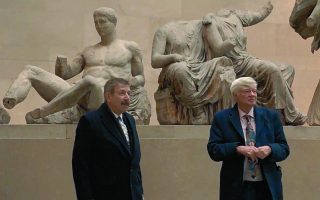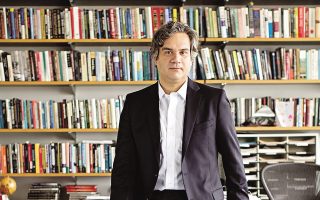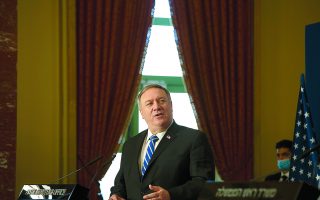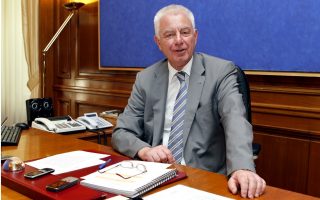Progress in Greece-US security ties ‘head-spinning’
Veteran analyst of Mideast and Turkish affairs discusses implications of deepening bond between Athens and Washington
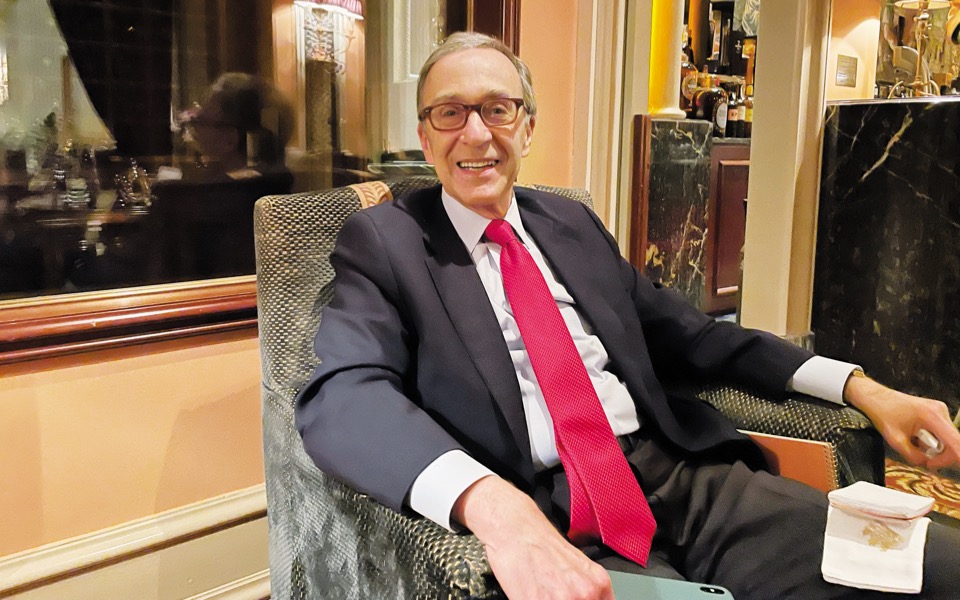
Transferring US troops via Alexandroupoli in northern Greece significantly reduces the time they need to reach the Black Sea and Eastern Europe, while at the same time allowing Washington to cushion itself against Ankara in case ties between the two countries deteriorate further, according to Alan Makovsky, senior fellow for national security and international policy at the Center for American Progress and a former State Department analyst on Turkey and the Middle East.
From 2001 to 2013, Makovsky served as a senior professional staff member on the Committee on Foreign Affairs in the US House of Representatives. Before that, from 1994 to 2001, he produced a considerable number of studies on the Middle East and Turkey for the Washington Institute for Near East Policy, a private think tank. Between 1983 and 1994, Makovsky worked at the State Department, where he dealt, also as an adviser, with Turkey’s wider region.
Speaking to Kathimerini, Makovsky describes progress in Greece-US security ties as “head-spinning,” particularly following the two amendments to the Mutual Defense Cooperation Agreement (MDCA) in 2019 and 2021. His experience at the State Department during the 1980s brings back memories of Washington’s difficult relationship with Athens and the late socialist leader Andreas Papandreou’s “out-with-the-bases-of-death” political campaign. Makovsky recalls his meetings at the State Department with Monty Stearns, the American ambassador at the time.
“He said: ‘Look, this is something Greece has to go through. But this is a reaction. It’s going to last a generation,’” Makovsky recalls. “I think he was right down to the centimeter.”
The veteran analyst emphasizes the role of Americans’ engagement with ancient Greek history, from their early high school years, in strengthening Greek-American ties. It is no coincidence that our conversation began with his queries about Ancient Corinth, which he visited during his stay in Greece. He wanted to know why the Corinthians had sided with Sparta against Athens during the Peloponnesian War.
The alternatives
The current status of the Greece-US relationship however dominate the conversation. Makovsky believes that the northern port city of Alexandroupoli can play a fundamental role.
“It is going to facilitate our access to Bulgaria and Romania, the NATO members that are on the Black Sea and Eastern Europe. It will save days over shipping [weapons systems and troops] through the Straits,” he explains, adding that “Erdogan talks about Canal-Istanbul. You know this is kind of a Canal-Alexandroupoli, obviously not seagoing but a way of bypassing the Straits.”
He does not think that Turkey would stop US warships from passing through the Straits. However, he deems that Alexandroupoli can be used as a contingency plan in case Turkey decides to restrict access to the Straits or force US forces to withdraw from bases in the country.
“I think the US has to be hedging against the day when we no longer have access to Incirlik [airbase] or other facilities in Turkey,” Makovsky says, adding that “it would be diplomatic and strategic malpractice not to.”
The experienced analyst hopes that US-Turkey ties can improve after 2023, in other words, should President Recep Tayyip Erdogan suffer a defeat in the country’s next election. “I don’t think people are counting on Erdogan losing,” he says, adding that “everyone recognizes that Erdogan may use extraordinary means to stay in power.”
That said, a political changeover in Ankara would not really impact on Greek areas of interest, Makovsky says. “Certainly on Greek-Turkish matters, things would look more the same than different,” he says.
However, if Turkey’s main opposition Republican People’s Party (CHP) were to win the elections, there will inevitably be change. “CHP’s core is secular, and that means it is structurally tied to the West in a way that Erdogan just isn’t,” says Makovsky.
“Erdogan has more options I would say, or at least thinks he does. I don’t think his other options are very good ones for his people, particularly if you think how important the West is for the Turkish economy,” he says.
The conversation with Makovsky inevitably moves onto the relationship between Israel and Turkey, a focal point for the US as well as Greece.
“I don’t think the rift is necessarily permanent but I think the possibility of reviving the previous Turkish-Israeli relationship, the one that flourished in the 1990s is virtually nil,” Makovsky says. He believes that “it will be a long time before rational Israeli policy makers could trust the idea that Turkey would be enduringly pro-West.”
On the contrary, he believes that Israel’s relationship with Greece and the Republic of Cyprus provides a kind of stability that the country can hardly find a substitute for. Another aspect, he emphasizes, is cooperation between the Greek and Israel lobbies in Washington.
“These two powerful, mainly ethnically based lobbies which tend to support Israel and Greece and Cyprus respectively, they are cooperating in a way they didn’t in the past,” he says.
A question of trust
Makovsky admits that a relationship with Turkey on paper has more advantages for Israel overall: the country’s size, its Muslim population, the borders with Iran.
“But you have to rely on [the other]. I think Turkey blew it. Maybe nothing is forever, but I think for decades hence it is very unlikely that Israel would abandon the Hellenic Alliance for the sake of Turkey,” he says.
Makovksy observes Erdogan’s efforts to bring Turkey back into the regional system. He looks at the upcoming visit of Abu Dhabi Crown Prince Sheikh Mohammed bin Zayed al-Nahyan, the UAE’s de facto ruler, to Ankara and the recent contacts made by Bahrain’s minister of foreign affairs, Abdullatif Al Zayani.
“The UAE like Israel has always had a good economic relationship with Turkey. Their economic relations continue to be very strong. They have reasons to try to tone down the hostility. But the reality is they are not going to trust Erdogan again,” Makovsky says. He adds that despite gestures by Erdogan, “people know where his heart is by now: support of Hamas, Islamic Brotherhood. These things don’t sit very well with the UAE, Bahrain or Saudi Arabia.”
Mitsotakis and Tsipras
“Mitsotakis [is] certainly one of America’s best friends in Europe,” Makovsky says of the Greek premier, adding however, “All the things he is doing now – I don’t think that they would have been so easy had not [ex-premier Alexis] Tsipras laid the groundwork.”
Recognizing a shift in public attitudes vis-a-vis the US, he says SYRIZA helped the country overcome chronic problems and deep-rooted anti-American sentiment. Tsipras, he says, played a key role in improving Greek-US ties while SYRIZA brought the entire political system to the point of realizing that a strategic relationship with the US was necessary.
“I believe there are still some leftists left in this country that don’t like the path that SYRIZA took, but I think they’ve been reduced to a very distinct minority,” he says.
